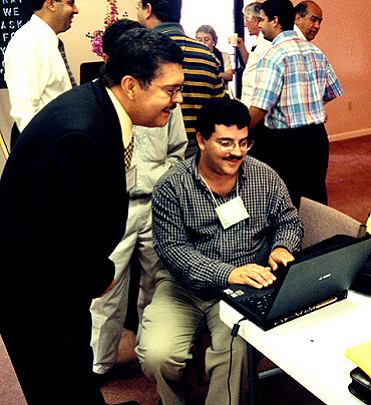| By
Michael Wacht
LAKE PLACID — The Rev. Cruz Edwin Santos
encouraged the approximately 20 Florida Conference Hispanic churches
and missions attending the second Hispanic Assembly Sept. 27-28 at
Good Shepherd United Methodist Church here to honestly assess where
they are in their lifecycle and begin revitalizing.
Santos is the Florida Conference Council on
Ministries’ new director of Hispanic ministries.
“Be honest with where your church is,”
Santos said. “We, as pastors, don’t like to hear that our church
is in decline, but we need to recognize where we are in order to grow.”
Santos’s comments were part of his
presentation to representatives of more than half of the conference’s
Hispanic congregations, including new ministries in Jacksonville and
Ocala.
The Assembly’s goal is to promote unity within
the Hispanic community, celebrate and plan ministries, and interpret
and promote conference ministries to the Hispanic community. This was
Santos’ first Assembly since being appointed director of Hispanic
ministries at the 2002 Florida Annual Conference event.
Santos said revitalization is a main focus of
the Comprehensive Plan for Hispanic Ministries, which was adopted by
the Florida Conference at the 2000 Florida Annual Conference Event.
“It’s one of our emphases…and it’s a priority of the Florida
Conference,” he said.
Congregational Mobilization is part of the
Comprehensive Plan, and it emphasizes revitalization, according to
Santos.
It is a four-pronged approach that encourages a
congregation’s laity and clergy to work closely together under the
guidance of a facilitator to strengthen the structure and ministry of
the church.
The process focuses on motivation, involvement,
organization and training. Each area includes a number of steps that
help the church involve more laity in leadership and ministry,
diagnose problems in the congregation and community, elaborate on
vision and mission, and restructure the administration and ministries.
“The process is about building more
participation in the life of the church, to share the leadership,
which is so often centered in one person,” Santos said.
|

|
|
Photo by Michael
Wacht |
| The Rev. Mike Quiñones (left), pastor of the Hispanic congregation at Orlando's Faith United Methodist Church, discusses the growth and economic impact of Florida's Hispanic population with John Quiñones, the lay delegate to the Hispanic Assembly from Marion Oaks Hispanic Mission in Ocala. |
Before a church can begin the mobilization
process, it must determine where it is in the congregational
lifecycle, according to Santos. The lifecycle begins with vision and
growth. Churches then grow their own customs and traditions, and
growth begins to slow. When a church becomes complacent, it loses its
vision and starts focusing on the past. “The vision is a memory,”
Santos said. “Church members say, ‘Ah, I remember when this church
was strong.’ ”
The final stages are decline and then death,
Santos said. Declining and dying churches are often in crisis, divided
and seeking help from outside sources.
Santos says many of the established Hispanic
congregations are in the decline part of the lifecycle. “It’s time
to exit this process, so they don’t die,” he said. “My
commitment as director of Hispanic ministries is to invite the
churches to be part of the revitalization process.”
Six Florida Conference congregations are
currently involved in the Congregational Mobilization phase, and seven
pastors and lay people have been trained as facilitators.
The Rev. Bill Jones, a retired pastor and an
author of the Comprehensive Plan for Hispanic Ministries, encouraged
congregations to take part in the process, but warned that God must be
at the center of any revitalization.
“If God is not in the process, it’s simply
another program, and it won’t bear fruit,” Jones said. “The only
one who will renew a church is God.” |